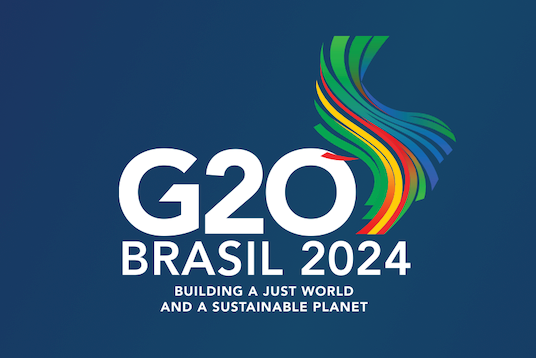Notícias
G20 Brasil 2024
Brazil's G20 Presidency: building a just world and a sustainable planet

Brazil will take on the rotating presidency of the G20 for a one-year term as of December 1, 2023, taking over from India, which held the presidency in 2023. It’s the first time that the country has occupied this position in this format - in 2008, Brazil presided over the G20 when the event was of ministerial level.
The country will be responsible for organizing technical meetings and ministerial conferences that will culminate in the 19th G20 Summit to be held on November 18 and 19, 2024, in Rio de Janeiro. The event will bring together heads of State and Government from the world’s main economies to discuss the world’s most important global topics.
Brazil’s presidency
Brazil’s G20 presidency is a historic and emblematic moment in the country’s resumption of prominence on the international stage, and will mean that issues that are a priority to President Luiz Inácio Lula da Silva’s third term will be put on the agenda, as follows:
- Fighting hunger, poverty and inequality;
- The three dimensions of sustainable development (economic, social and environmental)
- Global governance reform
Throughout Brazil’s term at the G20 presidency, over 100 meetings of the working groups and task forces that make up the grouping are expected to be held, both in person and virtually, at technical and ministerial level, in host cities across the five regions of Brazil. The highlight will be the summit, to be held in Rio de Janeiro.
About the G20
The group is made up of 19 countries from five continents, plus the European Union and the recently admitted African Union, thus bringing together nations that are considered developed and developing. The group consists of Argentina, Australia, Brazil, Canada, China, France, Germany, India, Indonesia, Italy, Japan, Mexico, Russia, Saudi Arabia, South Africa, South Korea, Turkey, the United Kingdom, the United States, the European Union and the African Union, which attained member status at the New Delhi Summit last September. The G20 accounts for around 85% of the world’s GDP, 75% of the global trade, and ⅔ of the world population.
How the G20 works
The G20 operates on a system of troikas –– a trio of members made up by the group’s last president; the current president; and the following one. The government that holds the presidency coordinates the group with support from the other two.
As of December 1, 2023, it will be made up of India, Brazil and South Africa.
The country that holds the G20 presidency is responsible for coordinating the group’s agenda in permanent contact with the other members so as to respond to pressing issues on the global agenda. The other members of the troika provide support to the country that holds the presidency to ensure the continuity of policies and agendas.
The presidential term runs from December 1 of one year to November 30 of the next. Of the 19 countries in the group, 16 have already held the presidency: USA, UK, Canada, South Korea, France, Mexico, Russia, Australia, Türkiye, China, Germany, Argentina, Japan, Saudi Arabia, Italy and Indonesia.
Work and topics
The G20 operates differently from traditional international organizations, and according to two parallel workstreams which communicate with each other:
- The Sherpa Track is led by the personal emissaries of G20 leaders, and oversee negotiations, discuss the points that form the summit’s agenda and coordinate most of the work. The sherpa appointed by the Brazilian government is Ambassador Maurício Lyrio, Secretary of Economic and Financial Affairs at the Ministry of Foreign Affairs (Itamaraty);
- The Finance Track deals with strategic macroeconomic issues and is led by member countries’ Finance ministers and central bank heads. The coordinator of the Finance Track is economist and diplomat Tatiana Rosito, Secretary of International Affairs at the Ministry of Finance.
In both tracks there are thematic working groups made up by representatives of member countries’ governments, as well as from guest countries and various international organizations.
Sherpa Track
The Sherpa Track is made up of 15 working groups, two task forces (one towards launching a Global Alliance against Hunger and Poverty and another for Global Mobilization against Climate Change) and a Bioeconomy Initiative.
The working groups are: Agriculture, Anti-Corruption, Culture, Development, Digital Economy, Disaster Risk Reduction, Education, Employment, Energy Transitions, Climate and Environmental Sustainability, Health, Tourism, Trade and Investment, Women’s Empowerment, Research and Innovation.
Finance Track
On this track, ministers belonging to this field and central bank heads meet at least four times a year (two of them alongside World Bank and IMF the general meetings). There are seven technical groups in the Finance Track, as well as a Task Force: Global Economy, International Financial Architecture, Infrastructure, Sustainable Finance, Joint Finance and Health Task Force, International Taxation, Financial Inclusion, International Financial Sector Issues/Financial Stability Forum.
G20 Social
Among the new features presented by Brazil’s G20 presidency is the G20 Social, a place where civil society can participate and contribute to discussions and policy formulations referring to the summit. The G20 Social encompasses activities from 12 Engagement Groups, as well as initiatives and events carried out alongside political and financial tracks and nongovernmental stakeholders, and demonstrations by societies from different G20 countries. Engagement Groups provide a broad platform for G20 members’ non-governmental participants to contribute to the grouping’s policy-making process.
The highlight will be the Social Summit to be held between November 15 and 17, on the eve of the G20 Leaders Summit on November 18 and 19, 2024, both in Rio de Janeiro. The Social Summit will reflect all the proposals discussed by G20 member countries’ society representatives.


